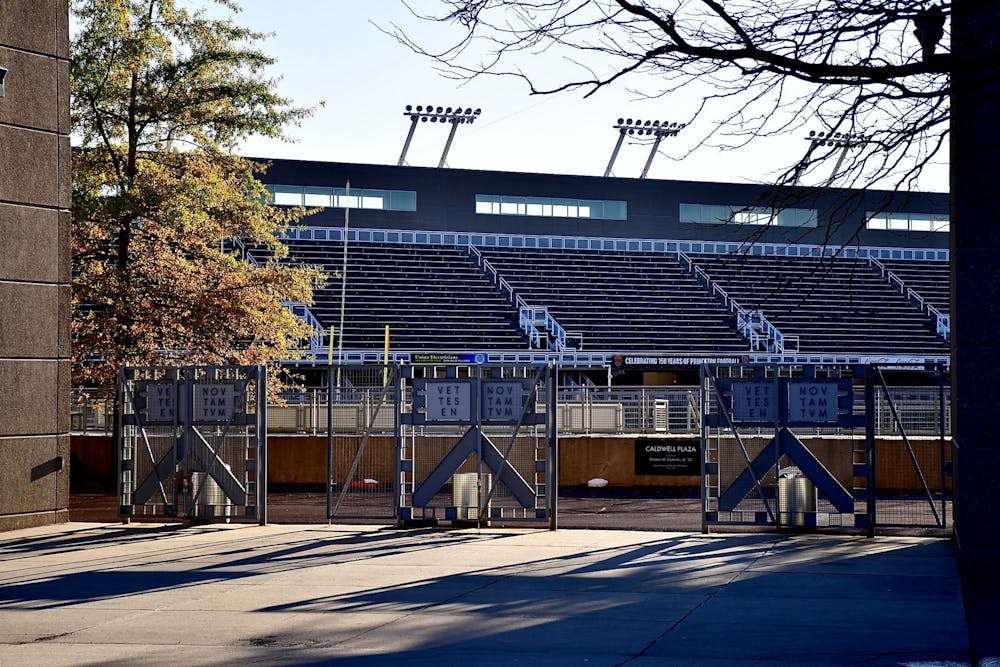FIFA announced on Feb. 4 that the 2026 men’s World Cup final will take place at the MetLife Stadium in East Rutherford, NJ. Less than 50 miles from the University, the home of the New York Jets and Giants will be the center of the soccer world on July 19, 2026.
For the Princeton community, which has deep connections with the U.S. men’s national team, the event hits close to home.
Jim Barlow ’91, head coach of Princeton’s men’s soccer team and Ivy League Player of the Year in 1990, is enthusiastic about what this means for soccer in the state.
“Everyone in the soccer community in New Jersey was so excited to hear that news,” he told The Daily Princetonian in an interview. “It’s just going to be an incredible, incredible experience.”
The Princeton men’s soccer team has an established connection with the U.S. national team setup. Palmer Stadium has been considered for international games in the past, and has held training camps for U.S. teams, including pre-tournament sessions for the 2010 men’s World Cup. Barlow recalls public training sessions attended by the University community: “it was a terrific experience.”
Perhaps the University’s most well-known link to the men’s national team is Bob Bradley ’80, who was head coach for the 2010 World Cup in South Africa.
Jesse Marsch ’96, who had previously played under Bradley at Princeton and Major League Soccer club Chicago Fire, served as an assistant coach to the 2010 US team. Since then, he’s gone on to coach top European clubs, including RB Leipzig in the German Bundesliga and Leeds United in the English Premier League.
He remembers the excitement of attending a World Cup semi-final in 1994 at Giants Stadium, before its replacement by Metlife Stadium in 2010. “Baggio played,” he recalled in an interview with the ‘Prince,’ referring to the renowned former Italian footballer, Roberto Baggio. “I think he scored the winning goal.” Baggio in fact scored both of Italy’s goals that day, sending the team to the tournament finals. “What that brought for the overall soccer community in the U.S. was amazing,” Marsch said.

For the Princeton community, Marsch and Bradley are still legends.
“[They] have meant so much to our program over the years,” Barlow said.
Last year, some media outlets speculated that Marsch would assume the U.S. men’s national team head coach position. Despite this, Marsch shared that “it’s not something that I would ever close the door on.”
The decision to host the final in New Jersey, Marsch believes, will continue to bolster soccer in the U.S. The men’s team did not qualify for the 2018 World Cup, but made it to the round of 16 in 2022 before the Netherlands knocked them out of the tournament. The women’s team suffered a shock exit against Sweden in last summer’s World Cup, but won the previous tournament in a landmark defense of their 2015 victory.

Marsch is hopeful nonetheless. “There’s no reason why we can’t have huge optimism for what this team can achieve,” he said.
His diagnosis is that a sport becomes important only if you experience it enough growing up. “When I come back [to the States],” he said, “the people who recognize me are people … in their 20s.”
According to FIFA, 1.5 billion people watched the 2022 World Cup final, making it the most watched event in the world. In 2026, all eyes will be on New Jersey.
“It’s mind blowing, right?” Marsch said of the viewership. “I hope that [this] World Cup, in general, electrifies … the U.S. soccer community.”
Theo Wells-Spackman is an associate Podcast editor and contributing News writer for the ‘Prince.’
Please direct any corrections requests to corrections[at]dailyprincetonian.com.








